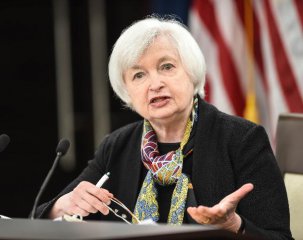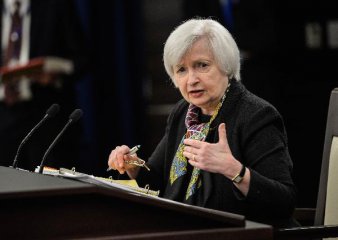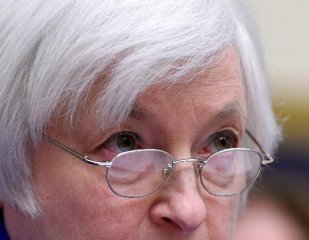
China has more wiggle room to maneuver macroeconomic policy and manage exchange rates as U.S. Federal Reserve signaled slower pace of interest rate hikes this year, U.S. experts say. After a two-day policy meeting wrapped up Wednesday, the Fed kept its benchmark short-term interest rates unchanged and lowered expectations for the path of rate increases this year, noting that "global economic and financial developments continue to pose risks" to the U.S. economy.
The Fed's updated projections showed that policymakers expected the federal funds rate to rise to around 0.9 percent at the end of 2016, implying two quarter-percentage-point rate increases this year, down from four estimated in December. The anticipation of slower pace of rate hikes signaled that policymakers don't want to be in a rush to raise rates amid global risks and they would like to wait for more time to assess the U.S. economic outlook.
"Proceeding cautiously in removing policy accommodation at this time will allow us to verify that the labor market is continuing to strengthen, despite the risks from abroad," Fed Chair Janet Yellen said Wednesday at a press conference. "Such caution is appropriate, given that short-term interest rates are still near zero, which means that monetary policy has greater scope to respond to upside than to downside changes in the outlook," Yellen said.
The Fed raised its target range for the federal funds rate by 25 basis points to 0.25-0.5 percent in December, the first rate hike in nearly a decade, marking the end of an era of extraordinary easing monetary policy. But the turmoil in financial markets and a slowdown in global economy since the start of the year has raised increased concerns about the strength of the U.S. economy, forcing Fed policymakers to hold off on any further rate hikes since then.
The Fed's dovish stance on Wednesday came after finance ministers and central bank governors of the G20 (Group of 20) agreed in Shanghai last month to use "all policy tools-monetary, fiscal, and structural-individually and collectively" to strengthen the global economic recovery. David Lipton, the first deputy managing director of the International Monetary Fund (IMF), recently also called for collective action to boost the global economy as "risk of economic derailment has grown."
"I want to make the case for action now," Lipton told a conference of the National Association for Business Economics earlier this month. "Now is the time to decisively support economic activity and put the global economy on a sounder footing." "I think the Fed probably will wait a while before raising interest rates again, that helps create a stable global environment (for China)," David Dollar, a senior fellow with the Brookings Institution and a former official of the World Bank and the U.S. Treasury Department, told Xinhua.
The Fed's less aggressive path of rate increases could provide some relief to emerging markets who are already struggling with currency depreciation and capital outflows. It could also open a window of opportunity for emerging markets to boost economic growth. The longer the Fed waits before raising interest rates, the further emerging markets can go with loosening monetary policy. That will buy time for emerging markets to put fiscal policy and structural reforms in place to help stabilize slowing growth.
China has announced more accommodative fiscal and monetary policies, supply-side structural reform and other pro-growth measures to prevent the economy from falling too quickly this year, according to a government work report delivered at China's annual parliamentary sessions this month.
"I hope that's effective to keep China's growth going pretty well," Dollar said. "I really think China needs to clearly show the growth rate is stabilizing." Dollar said "markets will be convinced that China is not in need of large (currency) devaluation," if incoming data in the next few months show evidence of stabilized economic growth.
Jacob Kirkegaard, a senior fellow at the Peterson Institute for International Economics, also said the Fed's "very gradual" pace of rate hikes would probably benefit the Chinese economy in some ways, especially for exchange rate policy. "If the U.S. interest rates have been rising rapidly, the dollar would have risen more rapidly, that would make it even more difficult for the Chinese government to maintain the relationship between the renminbi (RMB) and the dollar," he argued.
"Now the dollar is not going to be that strong ... it makes Chinese exchange rate management policy much much easier," he said. The dollar index weakened to an almost five-month low on Wednesday as investors re-evaluated the Fed's rate hike plan and their dollar positions. "The Chinese central bank can continue liberalizing the capital account ... the risk that they're forced to introduce capital controls is much smaller," Kirkegaard told Xinhua, noting that the pressure for capital outflows from China has eased.
China's foreign exchange reserves dropped by 28.57 billion U.S. dollars to 3.2 trillion dollars in February, the smallest decline since June, according to the People's Bank of China (PBOC), the central bank.
"If that pattern continues, I think the government will succeed in stabilizing the exchange rate," said Dollar, adding that it "makes a lot of sense" for China to manage the RMB exchange rate with reference to a basket of currencies as the three big currencies in the world -- U.S. dollar, Euro, Japanese yen -- are going in different directions. "Right now the currency seems pretty stable with reference to the basket," said Dollar. "I think the sentiment in the market has become calmer, right now there's not a big net outflow from China."






















Latest comments